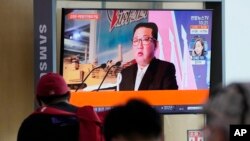Several U.N. Security Council members plus Japan urged their counterparts on the 15-nation council Wednesday to hold a public meeting regarding North Korea’s human rights situation.
“The regime’s egregious human rights violations, much like its unlawful WMD [weapons of mass destruction] and ballistic missile programs, are destabilizing to international peace and security and must be prioritized within the council,” U.S. Ambassador Linda Thomas-Greenfield told reporters on behalf of her government and Britain, Estonia, France, Ireland, Japan and Norway. All but Japan are Security Council members.
In 2014, a commission of inquiry mandated by the U.N. Human Rights Council published a lengthy and damning report on the situation in North Korea, saying “crimes against humanity of an unimaginable scale continue to be committed in the DPRK [Democratic People’s Republic of Korea].”
Since that time, the Security Council began discussing the DPRK human rights situation each December, despite objections from some members who said the council was not the appropriate U.N. forum for it.
On Wednesday, the council held a private discussion of the situation before Thomas-Greenfield spoke, flanked by envoys from the states joining her statement. The U.N. General Assembly is expected to adopt its annual resolution condemning the situation of human rights in North Korea on Thursday.
In November, the regime rejected international criticism of its rights record at the U.N., saying abuses were “fabrications cooked up by hostile forces” and part of a smear campaign against the government.
Those ongoing abuses include murder, enslavement, torture, imprisonment, rape, forced abortions, enforced disappearances, starvation and political, religious, racial and gender persecution.
“The U.N. Commission of Inquiry found that the DPRK commits crimes against humanity directed by the highest levels of the state,” Thomas-Greenfield said. “The modern world has no place for such brutality, and it is time for the council to address it. While we are glad the Security Council discussed this important topic today, we believe it is worthy of a briefing in an open session.”
In order to hold a public meeting, a procedural vote must be held, with at least nine members supporting the session. The veto does not apply in these kinds of votes.
From 2014 to 2017, the council held open meetings on the subject, but since then they have been held in private.
